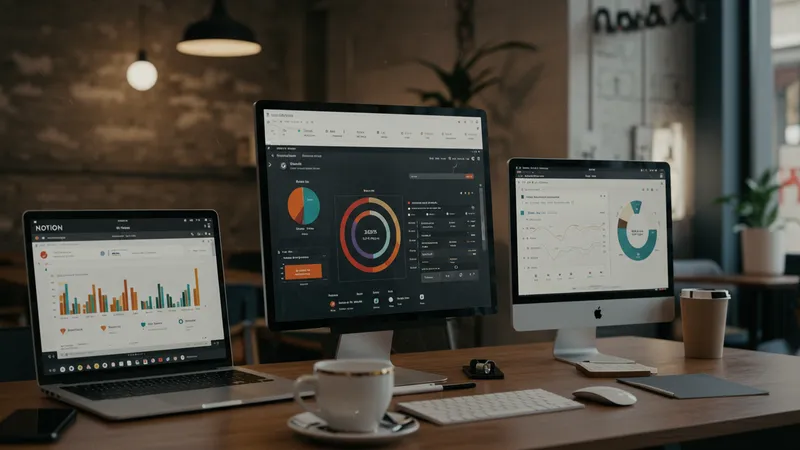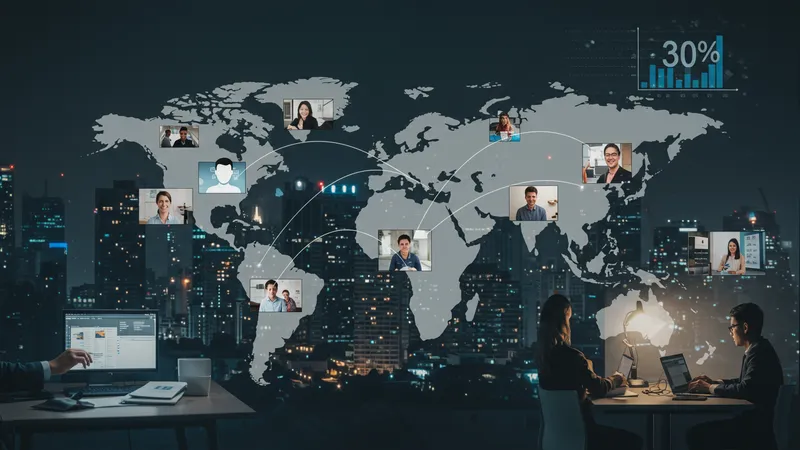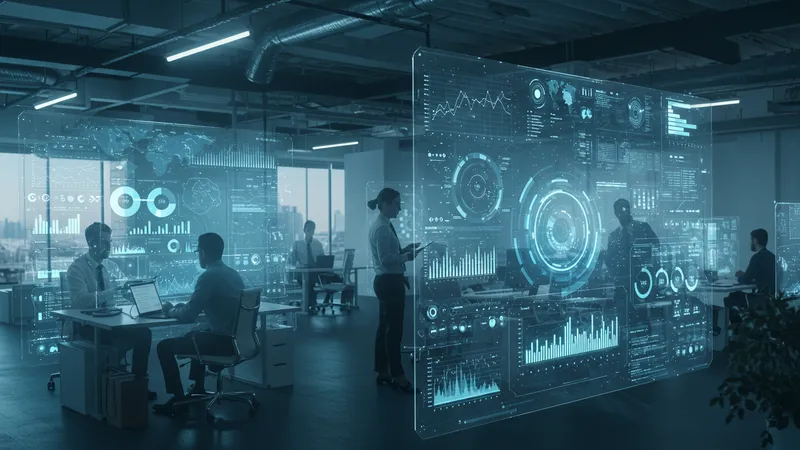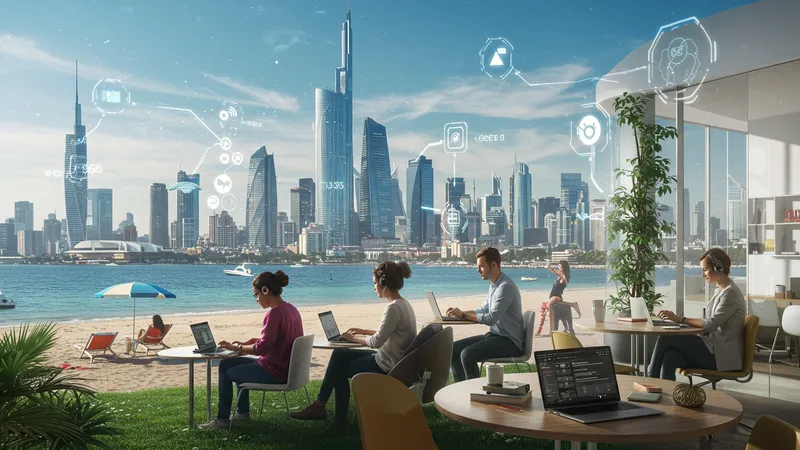

Imagine waking up to a sunrise in Bali, then logging into work as though you're right there in your office. That's not some future fantasy; it's happening now, thanks to a radical shift in remote work tools.
Digital nomads are riding this wave, and in 2025, these tools are more crucial than ever. They're not just handy; they’re essential lifelines for a successful remote career.

We've all heard the hype about digital nomadism, but did you know that 50% of remote workers feel more satisfied with their work-life balance while globe-trotting? That’s a hard fact highlighted by recent studies. But that's not the craziest part – job performance has also been shown to increase by up to 25% among this adventurous workforce. But that’s not even the wildest part…
While some skeptics argue that remote work leads to decreased engagement, the truth is quite the opposite. The flexibility that comes with choosing your workspace is linked to higher productivity, as workers tailor their environments to their needs. This ability to control one's surroundings is revolutionizing work culture. What’s next is shocking even the experts…
But what happens next shocked even the experts – it’s a profound change that's challenging traditional office norms and altering how we perceive work entirely. The story unfolds with unexpected twists and revelations that these seven game-changers bring to the table. Stay tuned as we uncover how digital nomads are creating the future of work as we know it.
When you think of remote work, you might imagine isolation and lack of teamwork. However, tools like Slack are flipping the script. By 2025, it's not just about communication; it's about creating virtual hub environments where teams across the globe work as though they’re in the same room. The secret? Advanced AI that anticipates your needs, enhancing productivity like never before. But there’s one more twist…

Team bonding, often a concern for remote teams, has been revolutionized with virtual reality (VR) integrations. Imagine a meeting where you don’t just see your colleagues but interact with them in a virtual space. It transforms team interactions and builds a sense of camaraderie and trust. Numbers show teams reporting a staggering 40% increase in project successes. But what you read next might change how you see this forever.
You might be wondering how task management fits into this evolving landscape. Enter Asana, with its predictive analytics enabling allocation of resources with pinpoint accuracy. The future is automated suggestions that keep workflows smooth and minimize conflicts. This means less hassle and more strategic thinking. There's another twist in how this impacts management dynamics, though…
Who would have thought that remote work tools could also cut down on costs? As digital nomads no longer need to commute or waste resources on physical infrastructure, their carbon footprint is decreasing significantly. Companies are realizing greener pastures with these digital nomads. The reduction in overhead and environmental benefits add another layer to this transformation. Ready for another mind-boggling change?
It’s no secret that performance metrics can make or break a project. In the realm of remote work, fresh insights have emerged. Tools like Microsoft Teams are offering compelling new metrics, far surpassing traditional KPIs by incorporating cultural fit and employee satisfaction scores. These factors have surfaced as critical drivers of performance, making them the non-negotiables of the future workspace.

Spyder analytics have shown that employees working flexible hours are 30% more likely to exceed set goals. What you read next could completely change your perspective on productivity measurements: there is no one-size-fits-all solution anymore. Recognizing the unique work styles of individuals is becoming paramount.
The ranks of remote work supervisors often worry about maintaining safety and confidentiality. The advancement in end-to-end encryption and secure access channels via platforms like Zoom has been a game-changer. Such tools are now classed as top-tier for safeguarding sensitive data while facilitating seamless collaborations over any distance.
The old notion of monitoring employee presence has evolved into smart engagement strategies using performance feedback loops, encouraging consistent improvement without the need for micro-management. How leaders adapt to this can spell the success or failure of initiatives, and it's paving quality-centered paths for the future.
How productivity is defined has taken a massive leap forward. The quintessential office space? Redesigned to nothing more than tailored digital environments that echo the diversity in work preferences. Software like Notion is a pivotal innovator, building personalized productivity spaces that reflect the bespoke needs of remote workers. It’s a complete redesign of the creative process.

The quiet corners of remote cafes and home offices have morphed into powerhouses of focus and output. With tech-driven flexibility, remote workers are not just getting more done, but doing so with higher quality. Imagine setting up a digital workspace customized entirely to cater to your peak efficiency hours.
In this revolution, the integration of AI into workspace tools allows real-time adaptability, promising that workers are always operating at their best. It represents a new age of productivity where data drives decisions, optimizing for outcomes you never thought possible before.
Even traditional industries are adopting these adaptable environments, illustrating that the benefits of remote work are far-reaching and transformative. As businesses innovate with these setups, they're discovering new horizons for growth and opportunity. Prepare for another groundbreaking revelation.
In 2025, digital nomads are not lone wolves; they are increasingly part of thriving online communities. Enter tools like Discord, which facilitate connections, giving remote workers a sense of belonging and community. They provide avenues for collaboration, learning, and support in environments often void of traditional structures.

But the real story is bigger. These communities are fostering innovation at unprecedented rates, creating ecosystems where ideas flourish and partnerships are forged instantly. It’s reshaping the very fabric of professional networking and development.
Collaborative learning has become a significant boon for digital nomads. With platforms such as Coursera, skill sharing and upskilling have become integral to staying competitive and engaged in the remote work field. This networked learning is rapidly becoming a staple in the career growth strategy for many.
The days of traditional mentorship are evolving into mentor circles – virtual gatherings where experiences and insights are shared, lifting entire communities to new lengths of success. It represents a cultural shift in how we perceive professional growth and career trajectories, opening doors to endless opportunities. But we’re not done yet; there's more in the transformative journey ahead...
At this point in time, remote work tools have granted unparalleled flexibility and control to remote workers. One such tool is Time Doctor, enabling workers to track productivity seamlessly while providing insights nobody imagined possible before. The outcome is a work-life balance that aligns perfectly with personal and professional aspirations.

The liberation from the traditional 9-to-5 is a game-changer. Instead of being glued to a desk, digital nomads now exercise the power to craft their schedules harmonizing peak productive times with leisure and personal commitments.
Staying connected on the move is another aspect redefined — the mobile phone has transformed into a fully operational workspace. From emails to documents and meetings, all are just a tap away. This capability has empowered digital nomads to work from virtually anywhere.
With this autonomy comes greater responsibility, emphasizing self-management and discipline. However, what seems like a challenge is a catalyst for innovation and efficiency, pushing workers to rethink productivity altogether. Yet, another shocking insight awaits...
While many might think remote work only benefits workers, businesses too are seeing a slew of economic advantages. Reduced overhead, fewer resources spent on physical infrastructure, and utilities translate into substantial savings — with projections indicating up to 30% reduction in operational costs.

This economic efficiency doesn’t just stop there. The ability to source talent from anywhere means companies can access a diverse pool of skills without geographical limitations, creating innovative teams that are not bound by location. This democratization of workforce recruitment expands the potential for growth.
More companies are investing in remote-friendly policies and are reaping the rewards of a more motivated, result-driven workforce. Productivity metrics have been positively impacted as workers in comfortable environments produce better results than the confines of traditional offices ever did.
Wage disparities based on locale are also a thing of the past, as companies embrace equitable compensation structures across the board. This staggering trend is elevating the global standard for employment practices. But what could possibly top this economic revelation?
Remote work is fundamentally altering how individuals perceive productivity and engagement. Rather than being bound by physical spaces, workers find themselves liberated to pursue what truly fuels their productivity — leading to higher satisfaction and psychological well-being.

It’s not just about the freedom to work from anywhere; it’s about a profound mental shift where work-life harmony is not just an ambition but a reality people live every day. This shift has decreased stress levels and improved mental health across the board.
The contrast to traditional office stressors is stark. In place of commutes and cubicles, these changes have fostered a greater sense of autonomy and control, allowing workers to choose their workflows based on their personal rhythms.
This burgeoning sense of empowerment and fulfillment could very well be setting the precedent for what future work-life integration will look like — challenging age-old notions of workplace dynamics entirely. What lies beyond this mental revolution?
Security was once the Achilles' heel of remote work. Yet today, we stand at a technological frontier where fears of digital breaches have significantly diminished due to cutting-edge security advancements.

Tools like VPNs are no longer mere afterthoughts, but robust defenders of data integrity. The implementation of sophisticated authentication protocols and cloud security measures has elevated the safety of typical work environments to new heights.
This breach-proof approach has turned many skeptics into advocates, showing that digital workspaces can indeed be as secure, if not more secure, than traditional corporate settings.
The sweeping security enhancements in remote tools assure stakeholders — from CEOs to employees — that their sensitive data is safe, instilling confidence to unlock the potential of true remote innovation. Yet the impact goes even further than that…
Remote work has not only reimagined what work looks like, but it has also transformed the way leadership operates. Traditional authoritative figures have given way to dynamic facilitators who nurture creative and self-driven talent.

With the help of collaborative platforms, remote leaders are now more than just managers; they are mentors empowering teams to innovate and express their unique strengths in a nurturing environment.
The importance of emotional intelligence has surged, as leaders now prioritize empathy and understanding in guiding their teams. This fosters a culture of trust and cooperation that traditional office setups struggled to achieve.
As leadership styles shift, they reveal the vast potential for growth and resilience in remote-oriented settings — a testament to what the future of work embodies. But there’s one last twist waiting…
The narrative of remote work has evolved into one of complete holistic integration, with every tool and strategy fitting perfectly into a broader ecosystem of enhanced workplace experiences.

Tools that facilitate not just productivity but also wellbeing are thriving. Platforms integrating health alerts, meditation prompts, and ergonomic advice ensure workers maintain wellness alongside their professional ambitions.
The seamless blend of personal life amenities with professional tools fosters a work environment where individuals don’t just survive but thrive, embodying a balance previously thought unattainable.
This unprecedented fusion lays the groundwork for a bold reimagining of work — a space where every element harmonizes to nurture human potential and a more meaningful connection to the work we do.
Remote work is quietly leading a revolution in sustainability though often overlooked. By minimizing the need for resources and reducing the reliance on commuting, digital nomads are helping to lower carbon footprints dramatically across industries.

Companies embracing this trend are incorporating sustainability as core business strategies, seen as environmentally sustainable equals profitable and desirable in modern economies.
Across the globe, there's increasing acknowledgment that remote work doesn't just equal efficiency, but it also leads to greener choices. Reports show transportation-related emissions significantly going down, positively impacting global climate efforts.
This eco-friendly ripple effect promises a brighter future — a vision of a world where technology doesn’t just transform work but also aligns with our environmental imperatives.
In the digital transformation of remote work, data has emerged as the hidden gem. Using metrics to drive decisions is becoming the new norm, empowering organizations to tailor strategies with unheard-of precision.

Predictive analytics and advanced data management are delivering insights that inform company culture, team formations, and individual employee development, ensuring strategic alignment across the board.
The power of data driven environments is altering how businesses approach challenges, optimizing every facet of work operations and driving unparalleled growth through informed decision-making.
The beauty of data’s hidden value renewing how we approach conventional work problems, catapulting productivity and innovation to new levels when intelligently harnessed.
As we look to the horizon, it's undeniable that remote work tools have shaped a future many thought impossible just a decade ago. The landscape is ripe with opportunity and potential beyond traditional confines.

The digital nomad's journey is emblematic of a wider shift towards rethinking life and work balance, catalyzing transformations that enrich not just professional lives but deeply personal ones too.
As disruptors continue to challenge norms and push the boundaries of work, the potential for inclusivity and innovation knows no bounds. What comes next is a paradigm where adaptability and resilience become cornerstones of success.
The evolution of remote work is far from over; it's a dynamic and ongoing process inviting us all to shape the workspace of tomorrow — a call for change that none can afford to ignore.
The journey of digital nomads leveraging remote tools has not just rewritten rules but has shifted the very foundation of work culture. As these tools continue to evolve, they're not just convenient; they are necessary for future-proofing careers and business strategies. The ripple effects are profound, offering lessons on innovation and adaptability. Share this article to expand the conversation further and let's collectively rethink the future of work.